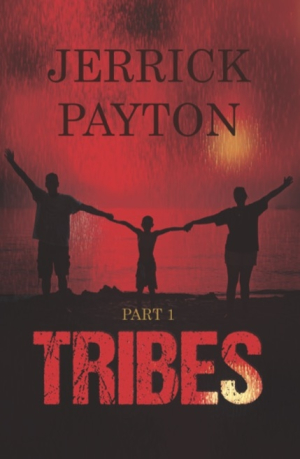Tribes
Part 1
A young vampire struggles with his morality and tries to lead a normal human life in the musing horror novel Tribes.
In Jerrick Payton’s surprising horror novel Tribes, a young vampire is tracked by overeager vampire hunters.
On his eighteenth birthday, David learns that he is a vampire. His lineage reaches back to the first vampire, created by the goddess Evelia. Before David can adjust to this new reality, vampire-hunting humans attack, wiping out his family. Though David lives in constant fear in the aftermath of this attack, he also begins a loving partnership with Dorian. A conspiracy to convert all humans into vampires further threatens to upend his world, though.
Herein, vampires are ordinary beyond their need for human blood, without immortality or supernatural abilities. They are mythologized in human lore: Good behavior is encouraged in children using vampires as threats, but no adults seem to believe they exist. To emphasize this relative normalcy, considerable space is devoted to mundane events in David’s life, effectually minimizing the threats he’s facing. David falls into cycles of pretending to be human, running from the hunters, and resettling somewhere new, making the story feel repetitive.
That most people in the story have vague motivations is a further impediment. For example, the Humans Against Vampires group tracks David specifically, but for undefined reasons and using undefined means. Its agents launch into dramatic monologues about why vampires are bad, even though vampires rarely feed on humans and only target those who are considered criminal or evil. Beyond the illogical nature of their claims, their soliloquies make it easy for their targets to escape.
The secondary cast is underdeveloped. David’s birth family, found family, Dorian, and his friends are introduced with speed, giving David people to lose, but they are not fleshed out on their own merit. People state their emotions and thoughts in unconvincing terms, and though David declares his closeness to them, they remain unknown quantities. When people he loves die, he moves on, and the impact that the lost have on the story is limited.
Short, repetitive sentences weigh down the prose, which is explicit in noting every time a character looks at another in the course of a conversation. People’s feelings are pronounced in sparse terms, as with “David was devastated at this revelation.” Scenes are set with minimal details about their environments so that harrowing moments, as with torture at the hands of vampire hunters, feel distant and flat.
Plot contradictions and ambiguities further compromise audience investment. David is told that vampires must drink blood before they turn ten to avoid serious illness, for example, though the vampires avoid blood until their eighteenth birthdays. Further, David goes years without consuming blood. In addition, David’s family hunts “bad people,” yet when David kills a vampire hunter to protect his family, he is regarded as vicious. By the revelation of the conversion conspiracy, interest wanes. While this new plot point raises the need for a sequel, it occurs too late to feel relevant to David’s story, draining the impetus to continue.
In the down-to-earth horror novel Tribes, a humanistic young vampire eludes a global conspiracy.
Reviewed by
John M. Murray
Disclosure: This article is not an endorsement, but a review. The publisher of this book provided free copies of the book and paid a small fee to have their book reviewed by a professional reviewer. Foreword Reviews and Clarion Reviews make no guarantee that the publisher will receive a positive review. Foreword Magazine, Inc. is disclosing this in accordance with the Federal Trade Commission’s 16 CFR, Part 255.

